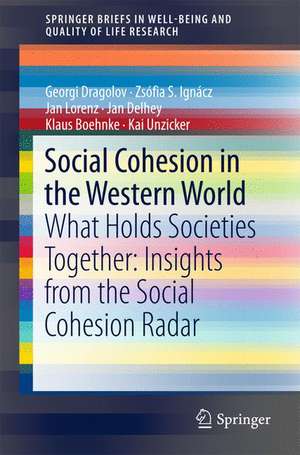Social Cohesion in the Western World: What Holds Societies Together: Insights from the Social Cohesion Radar: SpringerBriefs in Well-Being and Quality of Life Research
Autor Georgi Dragolov, Zsófia S. Ignácz, Jan Lorenz, Jan Delhey, Klaus Boehnke, Kai Unzickeren Limba Engleză Paperback – 5 iul 2016
Din seria SpringerBriefs in Well-Being and Quality of Life Research
- 5%
 Preț: 252.59 lei
Preț: 252.59 lei -
 Preț: 277.91 lei
Preț: 277.91 lei - 5%
 Preț: 324.88 lei
Preț: 324.88 lei - 5%
 Preț: 422.13 lei
Preț: 422.13 lei -
 Preț: 410.01 lei
Preț: 410.01 lei - 5%
 Preț: 326.32 lei
Preț: 326.32 lei -
 Preț: 379.09 lei
Preț: 379.09 lei - 5%
 Preț: 358.48 lei
Preț: 358.48 lei - 5%
 Preț: 322.85 lei
Preț: 322.85 lei -
 Preț: 376.80 lei
Preț: 376.80 lei - 5%
 Preț: 357.23 lei
Preț: 357.23 lei -
 Preț: 410.94 lei
Preț: 410.94 lei - 5%
 Preț: 356.32 lei
Preț: 356.32 lei - 5%
 Preț: 356.67 lei
Preț: 356.67 lei - 5%
 Preț: 357.61 lei
Preț: 357.61 lei -
 Preț: 377.73 lei
Preț: 377.73 lei -
 Preț: 375.07 lei
Preț: 375.07 lei - 5%
 Preț: 329.66 lei
Preț: 329.66 lei - 5%
 Preț: 356.46 lei
Preț: 356.46 lei -
 Preț: 378.34 lei
Preț: 378.34 lei - 5%
 Preț: 358.48 lei
Preț: 358.48 lei - 5%
 Preț: 358.32 lei
Preț: 358.32 lei -
 Preț: 376.80 lei
Preț: 376.80 lei - 5%
 Preț: 421.92 lei
Preț: 421.92 lei -
 Preț: 379.30 lei
Preț: 379.30 lei -
 Preț: 378.71 lei
Preț: 378.71 lei -
 Preț: 375.45 lei
Preț: 375.45 lei - 5%
 Preț: 358.84 lei
Preț: 358.84 lei -
 Preț: 376.04 lei
Preț: 376.04 lei - 5%
 Preț: 364.83 lei
Preț: 364.83 lei -
 Preț: 355.07 lei
Preț: 355.07 lei -
 Preț: 357.86 lei
Preț: 357.86 lei -
 Preț: 411.54 lei
Preț: 411.54 lei - 5%
 Preț: 329.94 lei
Preț: 329.94 lei -
 Preț: 377.95 lei
Preț: 377.95 lei -
 Preț: 478.53 lei
Preț: 478.53 lei - 5%
 Preț: 357.77 lei
Preț: 357.77 lei - 5%
 Preț: 356.67 lei
Preț: 356.67 lei -
 Preț: 410.55 lei
Preț: 410.55 lei - 5%
 Preț: 362.16 lei
Preț: 362.16 lei - 5%
 Preț: 357.23 lei
Preț: 357.23 lei - 5%
 Preț: 357.97 lei
Preț: 357.97 lei - 5%
 Preț: 359.42 lei
Preț: 359.42 lei - 5%
 Preț: 358.84 lei
Preț: 358.84 lei -
 Preț: 442.02 lei
Preț: 442.02 lei -
 Preț: 378.54 lei
Preț: 378.54 lei
Preț: 385.43 lei
Nou
Puncte Express: 578
Preț estimativ în valută:
73.75€ • 77.21$ • 61.02£
73.75€ • 77.21$ • 61.02£
Carte tipărită la comandă
Livrare economică 02-08 aprilie
Preluare comenzi: 021 569.72.76
Specificații
ISBN-13: 9783319324630
ISBN-10: 3319324632
Pagini: 133
Ilustrații: XXXII, 138 p. 17 illus., 14 illus. in color.
Dimensiuni: 155 x 235 mm
Ediția:1st ed. 2016
Editura: Springer International Publishing
Colecția Springer
Seria SpringerBriefs in Well-Being and Quality of Life Research
Locul publicării:Cham, Switzerland
ISBN-10: 3319324632
Pagini: 133
Ilustrații: XXXII, 138 p. 17 illus., 14 illus. in color.
Dimensiuni: 155 x 235 mm
Ediția:1st ed. 2016
Editura: Springer International Publishing
Colecția Springer
Seria SpringerBriefs in Well-Being and Quality of Life Research
Locul publicării:Cham, Switzerland
Cuprins
Theoretical Framework.- Methodology of the Social Cohesion Radar.- Level and Trend of Social Cohesion.- Syndrome Character and Regimes of Social Cohesion.- Macro-Level Causes and Effects of Social Cohesion.- Macro-Micro Associations of Social Cohesion.- A Case Study: Social Cohesion in Germany.- Conclusion and Outlook.
Recenzii
“The authors succinctly and coherently present a sophisticated analysis of social cohesion and its concomitant factors … . The book would be of interest to scholars of social cohesion, and social cohesion policy makers. I would also recommend the book to quantitative methods instructors. Dragolov et al. succeed in presenting complex statistical methods in an easily understood manner, making it accessible to those without a strong background in quantitative methodology.” (Stephen Richard Trotter, Nordic Journal of Migration Research, Vol. 7 (3), September, 2017)
Notă biografică
Kai Unzicker is Senior Project Manager at the Bertelsmann Stiftung in Gütersloh and is heading the Social Cohesion Radar project. He holds a degree in sociology from Philipps-University Marburg and a doctoral degree in educational science from the University of Bielefeld. Before joining Bertelsmann Stiftung he was a research associate at the Institute for Interdisciplinary Research on Conflict and Violence (University of Bielefeld).
Caracteristici
Provides a much needed analysis and review of social cohesion Offers a comprehensive view of conditions conducive to social cohesion Includes a vast data set from a large number of countries over a 25-year period Includes supplementary material: sn.pub/extras











